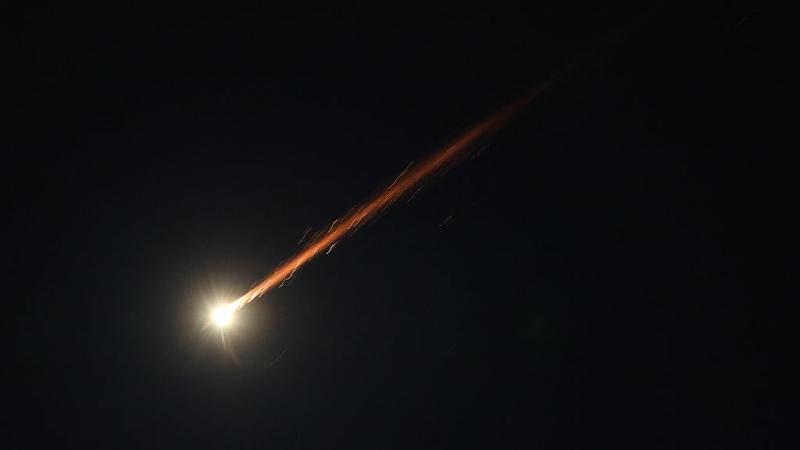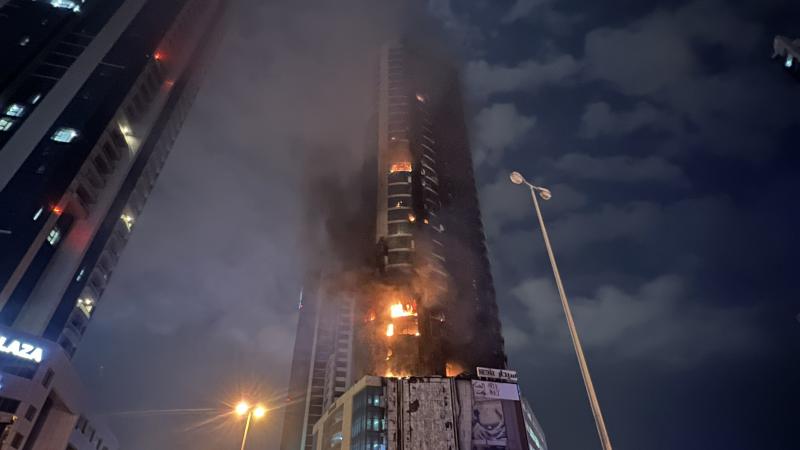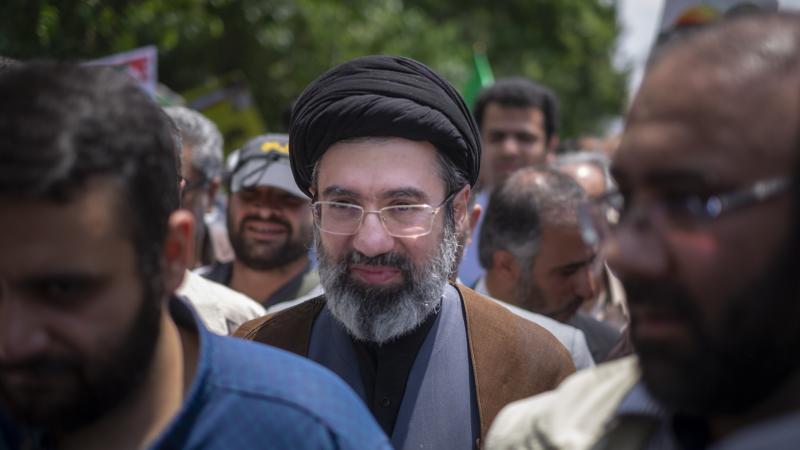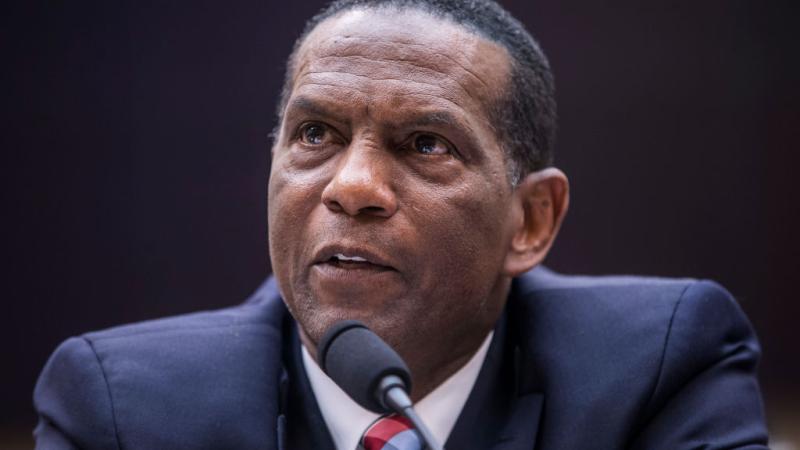Biden officials reverse Middle East rhetoric, signaling collapse of admin policy in the region
Last week, Secretary of State Antony Blinken admitted that the Middle East was in a dangerous situation, undermining National Security Strategy Advisor Jake Sullivan's claims last fall that President Biden’s policy led to a “quieter” region and de-escalated Israeli-Palestinian conflict.
As Iranian proxy groups throughout the Middle East continue to attack U.S. forces with drones and missiles, senior Biden Administration officials have been forced to confront a region that is increasingly more dangerous and more volatile than the one that they inherited. Experts say that the new violence in the Middle East is a direct result of a failure by the Biden Administration to deter adversaries in the region.
Last week, Secretary of State Antony Blinken delivered sobering thoughts about the conflicts in the Middle East, warning that the region is in one of the most dangerous periods in recent history.
“I think it’s very important to note that this is an incredibly volatile time in the Middle East,” Blinken said at a press conference last week with NATO Secretary-General Jens Stoltenberg, who was visiting the United States.
“I would argue that we’ve not seen a situation as dangerous as the one we’re facing now across the region since at least 1973, and arguably even before that,” Blinken added, alluding to the 1973 Arab-Israeli War, also known as the Yom Kippur War, when Egypt and Syria jointly attacked Israel on one of its high holy days.
The new shift in administration rhetoric comes despite officials’ previous claims that the Biden approach to the Middle East deterred aggression, promoted peace between Israel and its neighbors, and freed the United States from being bogged down in regional conflict.
In early October, National Security Advisor Jake Sullivan wrote in the pages of Foreign Affairs magazine, touting the accomplishments of the Biden Administration’s foreign policy successes in the Middle East. This essay was designed to show what the Biden Administration achieved, and hoped to achieve, in its foreign policy.
Sullivan claimed that the administration inherited a region that was “highly pressurized,” with a civil war in Yemen and attacks on U.S. troops in Iraq and Syria.
“Such attacks, at least for now, have largely stopped,” he wrote. “Indeed, although the Middle East remains beset with perennial challenges, the region is quieter than it has been for decades,” Sullivan concluded.
According to Sullivan, it was Biden Administration diplomatic efforts that calmed the Middle East. President Biden’s policy “emphasizes deterring aggression, de-escalating conflicts, and integrating the region through joint infrastructure projects and new partnerships, including between Israel and its Arab neighbors,” Sullivan wrote. “And it is bearing fruit.”
Sullivan indicated that challenges still persisted in the Israeli-Palestine situation, but claimed that U.S. diplomatic efforts had succeeded in de-escalating tensions.
“The Israeli-Palestinian situation is tense, particularly in the West Bank, but in the face of serious frictions, we have de-escalated crises in Gaza and restored direct diplomacy between the parties after years of its absence,” Sullivan wrote.
However, just five days later, Hamas terrorists from Gaza launched a brutal attack on Israel which saw militants swarm settlements and a music festival, killing over 1,000 Israelis. The United States government has previously reported that Iran supports Hamas like its other regional proxies. The Wall Street Journal also reported that Iran had a hand in planning the Oct. 7 attack, though the reports were disputed by other outlets.
The attack ignited a war as Israel defended itself. Ultimately the country chose to invade the Gaza Strip, a small tract of land on the Mediterranean coast where Hamas is based.
Foreign Affairs revised Sullivan’s essay in the online version to adjust for the attacks, removing parts touting the de-escalation between Israel and Gaza, specifically, and attaching an editor’s note.
Instead of achieving peace between Israel and its neighbors according to Sullivan’s vision, Israel is now embroiled in a war with Hamas terrorists in Gaza. This conflict is poised to spill into Lebanon, where Iran-backed Shia militias pose a constant threat to Israel’s Northern border and are inflamed over the attacks against Hamas.
Another Iran-backed group, the Houthis in Yemen, have launched an all-out assault on global shipping in the Gulf of Aden, a vital chokepoint on the fastest trade route between Europe and Asia.
Instead of deterring broader aggression, Iranian-backed proxies from Yemen, Syria and Iraq have also renewed attacks on U.S. forces stationed in the region in the midst of Israel’s war. Last week, three American soldiers were killed when an Iran-backed militia conducted a drone attack on a U.S. base in Jordan, a Middle Eastern kingdom that borders Israel.
Experts say that the administration’s Middle East policy, specifically its policy towards Iran, has failed to produce any of the results that Sullivan originally outlined in his essay or that Biden has promised since his presidential campaign.
Walid Phares, a foreign policy analyst and author of several books on Iran, says the breakdown of the Biden Administration’s Middle East policy should be attributed to its unwillingness to counter challenges from “enemies.”
“The Biden administration… has a microphone and they keep beaming towards the foes, the enemies, the challengers—the Iran regime, the Taliban, maybe behind that, the radicals, China, North Korea—they keep beaming, that they're not going to counter these activities,” Phares told the "Just the News, No Noise" TV show on Thursday.
Phares cited the Biden Administration’s decision to remove the Iran-backed Houthis from the designated terror organization list and willingness to provide sanctions relief to the Iranian regime in exchange for a prisoner swap as “messages that are encouraging the other side” to pursue goals counter to U.S. interests.
“That's why there is a feeling among the rulers of the Iran Islamic Republic, other jihadists—Hamas, Hezbollah—that this administration is not gonna stop them. So…what do they do? They attack, they attack everywhere, including, of course, in Gaza against Israel and in the Red Sea,” Phares said.
The State Department did not respond to a request for comment from Just the News.
After President Biden’s inauguration, his administration worked to revive the Iran nuclear deal, negotiated during the Obama Administration. The agreement, known as the Joint Comprehensive Plan of Action (JCPOA), sought to limit Iran’s nuclear capabilities and prevent the Islamic Republic from developing a nuclear weapon.
President Trump withdrew from the deal in 2015, claiming that it did nothing to deter Iran’s activities and only delayed its nuclear program. After withdrawing from the deal, the Trump Administration implemented what it termed a “maximum pressure” campaign on Iran, which included, listing its Houthi proxy in Yemen as a terrorist organization, implementing new sanctions, and killing Qasim Soleimani, the Iranian general responsible for terrorist attacks in Iraq.
After his inauguration, President Biden immediately reversed Trump’s foreign terrorist organization designation of the Houthis. The Biden State Department justified the move by the urgency of the humanitarian situation in the country. Previously, the terrorist designation for the group limited the aid that could be provided to the civil war-torn country.
The new administration also restarted negotiations with Iran in order to bring both the United States and Iran back into compliance with the JCPOA. Biden’s diplomacy stalled over Iran’s insistence that the United States should lift the sanctions imposed by the Trump Administration as a precondition for renewed talks on the nuclear deal.
Then, in summer of last year, the Biden Administration opened new channels of negotiation that were successful in lifting limited sanctions on the Iranian regime in exchange for a prisoner swap.
The deal, which included the prisoner exchange, saw the United States unfreeze $6 billion in Iranian funds that were being held in South Korea. The move was widely criticized by Republicans because of Iran’s reputation as a state sponsor of terrorism.
Just the News previously reported that Biden’s sanctions relief measures came even as Iran was still pursuing foreign terrorist operations, some in the United States, according to a declassified memo from the National Counter Terrorism Center.
The latest round of diplomacy fell apart when Hamas attacked Israel in October, upending efforts by the Biden Administration in the region to achieve both peace and an Iran that is integrated with the wider region. According to The Center for Strategic and International Studies, the October 7 attack is the deadliest per capita terrorist attack since the Global Terrorism Database started data collection in 1970, with a rate of slightly over one person killed per every 10,000 Israelis.
Presciently, former Secretary of State Mike Pompeo, who served in the Trump Administration, warned shortly after the 2020 election that easing sanctions on Iran and resuming nuclear diplomacy would be a “dangerous choice,” according to The Wall Street Journal. “[The] sanctions deprive the regime of funds it would use to carry out its malign activities,” Pompeo reportedly said.
Now that conflict has erupted between Israel and the U.S. and Iranian proxy militias, critics have widely argued that Biden’s Middle East and Iran policies have failed.
Indeed, this week the Biden Administration’s shift has come full circle. President Biden authorized strikes in Iraq and Syria against the proxy groups that have threatened American forces and were responsible for the deaths of three service members in Jordan.
In a statement that exemplifies just how far the administration has come from a “quieter” Middle East, NSA Sullivan told the media that the United States is prepared to take even further action against Iranian proxies.
He also did not rule out any strikes directly against Iranian interests or in Iran itself.
The Facts Inside Our Reporter's Notebook
Links
- continue to attack U.S. forces
- a press conference
- 1973 Arab-Israeli War
- reported that Iran had a hand in planing the Oct. 7 attack
- Sullivan wrote
- revised Sullivan's essay
- conducted a drone attack
- author of several books on Iran
- Joint Comprehensive Plan of Action
- withdrew from the deal
- reversed Trumpâs foreign terrorist organization designation
- diplomacy stalled
- unfreeze $6 billion in Iranian funds
- a declassified memo
- the deadliest per capita terrorist attack
- widely argued
- Bidenâs Middle East
- Iran policies
- strikes in Iraq and Syria
- told the media















